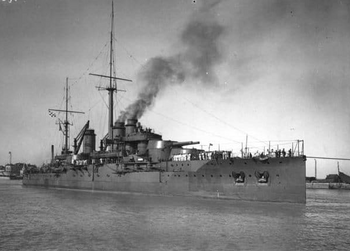Syara-class battleship

| |
| Class overview | |
|---|---|
| Name: | Syara-class battleship |
| Builders: | Makedonian Naval Foundary |
| Operators: |
|
| Preceded by: | Republic-class battleship |
| Succeeded by: | Basileus-class battleship |
| In commission: | 1906-1920 |
| Planned: | 12 |
| Completed: | 7 |
| Cancelled: | 5 |
| Lost: | 6 |
| Retired: | 1 |
| Preserved: | 0 |
| General characteristics | |
| Type: | Battleship |
| Displacement: | 23,475 t (23,104 long tons) |
| Length: | 166 m (544 ft 7 in) |
| Beam: | 27 m (88 ft 7 in) |
| Draft: | 9.04 m (29 ft 8 in) |
| Propulsion: | 4 shafts, 2 x steam turbine sets |
| Speed: | 21 knots |
| Range: | 7,800 km |
| Complement: | 1,115 |
| Armament: |
|
The Syara-class battleship was a series of dreadnought battleships built by the Republic of Syara. It was the first dreadnought utilized by the Navy of the Syaran Republic, built in response to the introduction of the HMS Eerika Waterly-Davion by the Cacertian Empire. Seven were ultimately built, the first four built between 1906-1916 (Child of Nature, Shadows and Light, Eternally Kept Vigil, Salvation in Purpose), with three more completed between 1918-1921 (Redeemer of Souls, Measure of Faith, Unbroken Sacred Service).
Introduced in 1906, a total of 12 were planned but the outbreak of the Syaran-Ruvelkan War meant that only four were prepared in time for the Divide War. The Syara-class was the only Syaran battleship type capable of challenging the Cacertian Royal Navy on relatively equal terms, but was nevertheless inferior to its Cacertian counterparts. Salvation in Purpose was sunk in 1916, while Shadows of Light was heavily damaged in 1918 and eventually scrapped. Production of the class was continued after the war ended in 1918, but by then changes in technology and naval doctrine resulted in deferrment to development of the Galania-class battleship. The remaining Syara-class ships remained in service into the Siduri War, where they served primary as convoy escorts in the Nuandan Ocean and Sundering Sea. Child of Nature and Measure of Faith both survived the war, but were sold and broken up for scrap in the 1940s during the Broken Years.